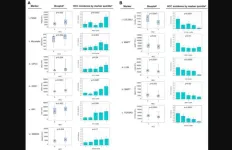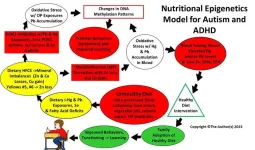(Press-News.org)
People who quit smoking see major gains in life expectancy after just a few years, according to a new study by University of Toronto researchers at Unity Health Toronto.
The study, published in NEJM Evidence, shows that smokers who quit smoking before age 40 can expect to live almost as long as those who never smoked. Those who quit at any age return close to never-smoker survival 10 years after quitting, and about half that benefit occurs within just three years.
“Quitting smoking is ridiculously effective in reducing the risk of death, and people can reap those rewards remarkably quickly,” said Prabhat Jha, a professor at U of T’s Dalla Lana School of Public Health and Temerty Faculty of Medicine, who is executive director of the Centre for Global Health Research at Unity Health Toronto.
The observational study included 1.5 million adults in four countries (the U.S., UK, Canada and Norway), followed over 15 years. Smokers between the ages of 40 and 79 had an almost three-fold risk of dying compared to those who never smoked, meaning on average they lost 12 to 13 years of life.
Former smokers lowered their risk of death to 1.3-fold (or 30 per cent higher) compared to never smokers. Stopping smoking at any age was associated with longer survival, and even those who quit for less than three years gained up to six years in life expectancy.
“Many people think it’s too late to quit smoking, especially in middle age,” said Jha. “But these results counter that line of thought. It’s never too late, the impact is fast and you can reduce risk across major diseases, meaning a longer and better quality of life.”
The researchers found that quitting smoking reduced the risk of dying from vascular disease and cancer, in particular. Former smokers also reduced their risk of death from respiratory disease, but slightly less so, likely due to residual lung damage.
There are currently about 60 million smokers in the four countries involved in the study, and over a billion worldwide. The global rate of smoking has fallen by more than 25 per cent since 1990, but tobacco is still a leading cause of preventable death.
Jha said the findings should add urgency to efforts by governments to support people who want to stop smoking. “Helping smokers quit is one of most effective ways to substantially improve health. And we know how to do that, by raising taxes on cigarettes and improving cessation supports.”
Canada is long overdue for an increase in the federal excise tax on cigarettes, and many other countries could lower smoking rates by raising taxes, Jha said. Cessation supports can include clinical guidelines and patient resources such as helplines, but also a whole-health-system approach.
“When smokers interact with the health care system in any way, physicians and health professionals can encourage them to quit, pointing out how well quitting works,” Jha said. “This can be done with concern, and without judgement or stigma, recognizing that cigarettes are engineered to be highly addictive.”
END
Researchers at the University of São Paulo’s Luiz de Queiroz College of Agriculture (ESALQ-USP) and the Federal University of Viçosa (UFV) in Brazil have shown for the first time that bixin or annatto powder, a carotenoid pigment extracted from the seeds of the achiote or annatto tree (Bixa orellana), is not produced only in the seeds but also in other organs, and that the process intensifies in the plant’s adult phase.
An article on the study published in the Journal of Experimental Botany, also describes genetic modifications in the species that can optimize production of the pigment, which is widely used in the food ...
Humans are still evolving, and Tatum Simonson, PhD, founder and co-director of the Center for Physiological Genomics of Low Oxygen at University of California School of Medicine, plans to use evolution to improve healthcare for all.
Her latest research, which was published February 9, 2024 in Science Advances, reveals that a gene variant in some Andean people is associated with reduced red blood cell count at high altitude, enabling them to safely live high in the mountains in low-oxygen conditions. Simonson’s UC San Diego lab is applying those findings toward understanding whether there may be a genetic component ...
Waltham — February 9, 2024 — For Black men with prostate cancer, racial representation is a key factor affecting trust in websites offering information on prostate cancer, reports a study in the March issue of The Journal of Urology®, an Official Journal of the American Urological Association (AUA). The journal is published in the Lippincott portfolio by Wolters Kluwer.
"Our study shows that representation matters to Black patients seeking prostate cancer information online," comments lead author Stacy Loeb, MD, MSc, PhD (Hon), of New York University Langone Health. "Not only does it impact trust in the information, but a lack ...
From work to school to socializing, COVID-19 has impacted just about every part of our lives—and now Boston University research has shown that also includes what happens in the bedroom. A study of more than 2,000 cisgender women found the coronavirus disease can impair sexual function, with long COVID having an especially detrimental effect.
“If you’re sick with COVID, you’re probably less interested in sex and maybe your body is less prepared to have sex,” says Amelia M. Stanton, a BU College of Arts & Sciences assistant ...
“A fundamental hypothesis we sought to test was whether biomarkers from the TGF-β signaling pathway might be of novel value in risk stratification of HCC in the clinical cirrhotic setting.”
BUFFALO, NY- February 9, 2024 – A new research paper was published in Genes & Cancer on February 5, 2023, entitled, “Mechanistically based blood proteomic markers in the TGF-β pathway stratify risk of hepatocellular cancer in patients with cirrhosis.”
Hepatocellular carcinoma (HCC) is the third leading cause of death from cancer worldwide but is often diagnosed at an advanced incurable stage. Yet, despite the urgent need for ...
There may, as they say, be plenty of fish in the sea — but angling opportunities on Utah’s streams, rivers and lakes are getting more crowded.
The number of anglers trying their luck on Utah waters has consistently increased over the years, meanwhile it’s getting more expensive for state managers to raise and stock gamefish and increasingly difficult to access water-based recreation during the ongoing megadrought.
Managers of fisheries in the state are being asked to do more with less these days, and they’re working more strategically to create sustainable opportunities for everyone picking up a rod and ...
Research Highlights:
In the EMBOLISE clinical trial, obstructing (or blocking) an artery that supplies blood to the dura, the protective covering of the brain, along with surgery to remove pooled blood reduced the chances by nearly 3-fold that blood would reaccumulate and require additional surgery. According to researchers, complications related to the embolization procedure were low, and neurological function was comparable to those without embolization.
Chronic subdural hematoma, a pooling of blood between the brain and one of its outer coverings, is one ...
Waltham — February 8, 2024 — For patients undergoing total hip arthroplasty (THA), the use of robotic-assisted surgery and surgical navigation techniques is not associated with an increased risk of periprosthetic joint infection (PJI), suggests a study in The Journal of Bone & Joint Surgery. The journal is published in the Lippincott portfolio by Wolters Kluwer.
Computer navigation (CN) and robotic assistance (RA) do not alter the risk of PJI after total hip replacement surgery, according to the new research by Alberto V. Carli, MD, and colleagues of Hospital for Special Surgery, New York.
Could CN and RA increase risks during hip replacement?
Computer ...
In a recent publication released by PubMed, American scientists led by Dr. Dufault at the Food Ingredient and Health Research Institute, reported the results of a clinical trial in which parents who received nutritional epigenetics education significantly reduced their consumption of ultra-processed foods while increasing their intake of whole and/or organic foods. The education intervention used curriculum focused on the constructs of the nutritional epigenetics model that explains how autism and attention deficit/hyperactivity disorder (ADHD) may develop from the excess consumption of ultra-processed ...
· First-of-its-kind study of immune genes in Alzheimer’s patients’ blood
· Immune T cells are altered and entering brain
· Uncertain whether changes precipitate the disease
CHICAGO --- A new Northwestern Medicine study has found the immune system in the blood of Alzheimer’s patients is epigenetically altered. That means the patients’ behavior or environment has caused changes that affect the way their genes work.
Many of these altered immune genes are the same ones that increase an ...





